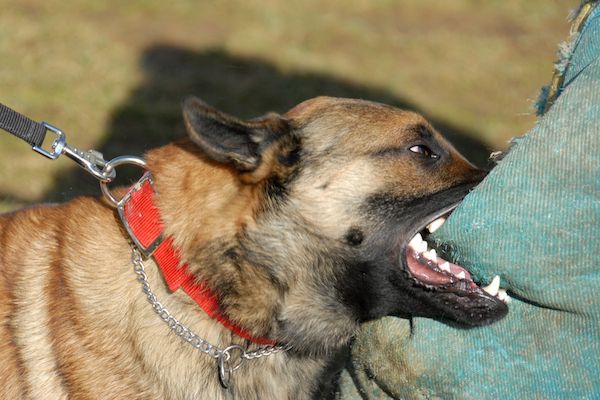
Dog bites cause tremendous physical harm, but they also commonly leave an emotional mark on victims. Around 4.5 million dog bites injure people in the U.S. every year, resulting in over a billion dollars of medical bills and monetary loss annually to victims. Contributing to these damages are claims of pain and suffering due to PTSD inflicted by dog bite trauma. It is always important to consider the injuries caused both on and below the surface of each dog bite attack.
What Is PTSD?
The National Institute of Mental Health defines PTSD as a mental disorder experienced by people exposed to traumatic events. PTSD has several different categories of behaviors, thoughts, and experiences which contribute to a diagnosis. A physician can diagnose a patient with PTSD only if the patient experiences all the common symptoms for the period of one month. Sometimes these symptoms go away quickly, but other times PTSD can become chronic over a long period of time.
PTSD affects adults and children differently. The general rule of thumb is that PTSD is easier to detect in adults but more challenging to treat, while it is more difficult to see in children yet easier to treat. Children have a more difficult time expressing their emotions than adults, but they also have the advantage of a developing brain. Children’s brains create new neural connections and can repair areas of the brain far easier than adults. This means children can potentially recover from PTSD far easier than adults. However, PTSD can cause the same severe distress without regard to age.
Symptoms of PTSD After a Dog Bite
Post-traumatic stress symptoms come in four main varieties: intrusive memories, avoidance, mood changes, and physical changes. Each symptom must be present for a verifiable PTSD diagnosis.
Intrusive Memories
The symptoms of intrusive memories may include:
- Intense emotional reactions to memories of the dog bite;
- Recurring, uncalled for memories of the dog bite;
- Nightmares or frightening visions of the dog bite attack; and
- Vivid flashbacks to the attack.
These intrusive memories create a large disturbance in a victim’s life and make it difficult for them to move on from the traumatic event.
Avoidance
Avoidance generally means staying away from things that may remind a victim of the dog bite. It can include places, people, thoughts, jobs, and feelings. Someone practicing avoidance shows they are still being affected on a daily basis by memories of the dog bite trauma. For example, someone bitten by a dog intentionally avoids the place where the attack happened.
Mood Changes
Mood changes represent one of the more noticeable symptoms of PTSD after a dog bite. These symptoms may include:
- Lack of interest in previously enjoyable hobbies,
- Memory problems,
- Drastic personality changes,
- Depressive thoughts about the future,
- Self-destructive thoughts,
- A feeling of emotional numbness, and
- General apathy toward feeling better.
Victims experience these mood changes due to the negative mental changes PTSD creates. Anxiety and depression play a large part in the mood changes associated with PTSD.
Physical Changes
People living with PTSD experience physical changes to their arousal and reactions to certain stimuli. Additionally, people with PTSD experience negative physical lifestyle changes. Physical change symptoms include:
- Self-destructive behaviors,
- Issues with sleeping and concentration,
- Unusual aggressive behaviors,
- Uncharacteristic nervousness, and
- Being startled and frightened regularly.
Physical changes can be exacerbated by existing anxiety and depression before the trauma. Depression, in particular, is considered comorbid, with around half of all people suffering from PTSD also being diagnosed with depression.
Compensation for PTSD After a Dog Bite
Calculating Damages
Victims of dog bites should immediately seek medical care for their physical injuries and document the cost of treatment. Even after physical ailments are cared for, victims need to be mindful of mental anguish, including PTSD. PTSD can take months to develop, and it must be carefully monitored. The PTSD damages represent mental pain and suffering damages that can be tacked on to medical bills, lost wages, and other quantifiable damages. A victim that takes careful note of the harm they suffered will have an easier time getting compensation.
Filing a Lawsuit
When a dog bite happens, the attorneys for the victims hold the owner accountable for their injuries. Each state in the U.S. has laws holding dog owners liable for their pet’s wrongdoing. Differing state laws create a split between one-bite states and strict liability states.
One-bite states
Sixteen states in the U.S. possess laws referred to as one-bite. One-bite states give the benefit of the doubt to the owners of dogs who bite others. One-bite laws place the burden of proof on the victim. If a dog in one of these states bites you, you must prove that their owner knew or should have known about the dog’s aggressive tendencies. If you can’t do this, you can’t hold the owner liable for your injuries. For example, say a dog with no prior vicious behavior, such as previous attacks, bites you. In this case, it would be difficult for you to hold the owner liable, as the dog in question gave no signs of being aggressive previously.
Strict liability states
The legislature of each of the 34 strict liability states, including Washington, have statutes that make dog owners liable for dog bites regardless of whether they knew their dog was dangerous.
Strict liability states like Washington give greater opportunity to the victims of dog bites to sue owners for compensation. If a victim can successfully show their injuries and how the owner’s dog caused them, they will generally be able to obtain compensation for their injuries. Even if the dog owner had the most genial and well-mannered dog, if it bites someone and causes injury, the owner is held strictly liable as per statutory law. Keep in mind, however, that there are exceptions to this rule. For example, the dog owner has a defense if the victim provoked the dog or was trespassing on private property when they were attacked. Your attorney can help you assess your claim and counter any defenses the dog owner may raise.
We’re Here to Help
If you or a loved one suffer from a dog bite, do not hesitate to reach out to our attorneys at Brett McCandlis Brown & Conner PLLC today. We have helped victims recover millions of dollars in damages, and we will be glad to assist you in getting the compensation you deserve. Contact us online.


